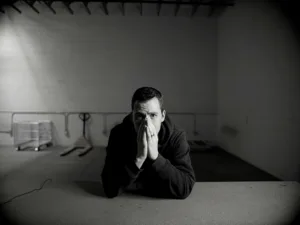What Loved Ones Can Expect From The Process
This is a blog for anyone with a male in their lives who is struggling with addiction and/or a mental health issue. Learn how to talk to your partner about his mental health. At Denver Men’s Therapy, we specialize in working with men and their loved ones. Here are some tips on talking to your partner about his mental health and what to expect from the therapy process. Going to therapy for men can be difficult, hopefully, this will help you broach the subject.
Men in Therapy
More and more men are going to psychotherapy because they understand just how effective it is. This often causes the partners of those men to deal with their insecurities about what may come up during therapy sessions. It is normal for the partner or loved one to feel worried and concerned about the outcome and process of therapy.
When a husband, partner, or son does finally get help for his problems, a new set of issues may arise. Nonetheless, a psychotherapist is an ally from whichever angle you look at it. Keep reading to find out why you should have faith in the process. You may realize that psychotherapy may allow your partner and you to grow as individuals and together.
How to talk to your partner about his mental health
- Find a time when things are cool, calm, and relaxed. Addressing things in the heat of the moment is usually not the best time.
- Use the “Sandwich Technique” – begin and end with loving, honest, and connecting statements. For example, “I love you very much. You are a strong man, a loving husband, and a great father. I have noticed that a lot of little things get you upset these days. I am concerned because I love you.”
- Consider setting a time limit for the conversation. “I would like to talk with you for five minutes to share my concerns with you. After five minutes you can reflect on what I have said.” This can be helpful for some men who get overwhelmed and anxious with long conversations or have poor attention.
- Remember that avoiding an ongoing problem is also co-signing or allowing the issue to continue. It’s okay, in fact healthy, to address the issue with the man you love.
- We are responsible for our health and well-being. We cannot force or manipulate someone into getting help. You cannot do the work for him.

How Mental Health and Addictions Affect a Relationship
Mental health and addiction problems can negatively affect relationships. As a spouse, partner, friend, or family member, we’re affected by his struggle in many ways. Addiction, depression, emotional disturbances, posttraumatic stress disorder, aggressive behavior, and a range of mental disorders all present the ultimate challenge for any relationship. Usually, things develop slowly over time. When a man starts manifesting symptoms of a disorder, his partner may sometimes feel empathy and want to help. Similar to learning that someone has a serious physical illness. The partner may start by trying to find help for him, be there, support him, and show understanding. However, mental health problems present a somewhat greater challenge for the caring partner. Mental health symptoms are very challenging to address or be around because they often involve changes in behavior. For example, the depressed man often acts out in irritability or anger. This can lead to confusion for those around him; “is he being a jerk or is this a symptom of the depression?” The symptoms can seemingly change the man’s personality. Over time, this can negatively impact the relationship and the partner. It can cause mental health symptoms for the partner; the behavior leads to chronic stress, which can lead to burnout, which can lead to anxiety and depression.
Yes, bodily illness also presents a huge challenge for everyone affected. Nonetheless, even when disease changes the patient’s personality, it’s not the same as with mental health disorders. In such cases, it’s much easier to see that the illness causes the change. And you can expect it to go away when the illness disappears. Often, there are physical reminders of this fact, visits to a doctor, lab results… With mental health disorders, both the causes (at least to some extent) and the consequences evolve on the same plane, within the psyche. An alcoholic can become pathologically jealous and begin to do bizarre “checks” of his spouse’s wardrobe or whereabouts. This is because alcoholism comes with gaps in memory, impotence, and other issues. As a result, the addict can become extremely insecure about his ability to provide emotional and sexual satisfaction to his spouse. Therefore, he begins to obsess about whether she or he has found someone else to give her that. A man with an anxiety disorder, or social phobia, for example, could evoke compassion and pity in a woman at first. But, she might become tired of having to do chores and go to gatherings alone. If a man survives a trauma, he could acquire post-traumatic stress disorder. As a result, he could (unintentionally) hurt the ones he loves physically when he experiences a flashback. Many times, a man will react with something that is called “acting out”. This means acting in a way that allows tension relief but does not address the inner conflict causing the tension. He might self-medicate by using extramarital sex as a psychological painkiller. He could engage in risky behaviors, practice unsafe sex, use drugs, or get into fights… Not to mention direct aggression against his partner, and psychological or physical abuse. All of this is, from a psychotherapist’s perspective, a sign that something deeper is going on. But, it’s much more difficult for a partner to cope. It’s very hard for a partner to maintain an objective and compassionate attitude amid the storm.
So, after some time, most partners begin to wonder. They ask themselves whether their man has always been aggressive. They explore if he has an “addictive personality” or if he is a “serial cheater.” They might begin to believe that he is lazy, not depressed. They, understandably so, might become more focused on how much his behavior hurts them. It’s normal to start feeling resentful. Partners will sometimes receive advice from those close to them. Most often, they will hear that they should leave the man. This advice is well-intentioned because a loved one might see that the partner isn’t treated right. Yet, these feelings and doubts also cause a lot of guilt in the partner. Everyone in that position feels that they should be more caring and understanding. However, they often just can’t get over their pain. This pain is very real and has a lot of emotional charge. Often we hear the partner of men with mental health disturbances saying: “I just want my Joe back”. When enough transgressions accumulate, the relationship is often over. And, the man is left alone with his problems. The partner in turn is also alone. At Denver Men’s Therapy, we see another option; when addiction and mental health issues are treated and all family members are supported, both the man and those who love him can become a stronger team and live a fulfilling life together.
Self-Care For You
When you have a man in your life who is struggling with addiction and/or mental health issues it is extremely normal for the partner to struggle as well. Over time the partner can start to feel hopeless, burned out, depressed, and anxious. The man’s behavior might bring up traumatic memories from childhood or other relationships. Therefore, you must take good care of yourself as you go through this journey to a healthy life and relationship. When we don’t take good care of ourselves we cannot be our best selves to help others. Here are some tips and ideas for self-care.
- Take time to engage in activities you love. This could be yoga, reading a good book, or enjoying a cup of your favorite tea.
- Reach out to supportive family and friends. Do not isolate.
- Get outside and keep active. We live in Colorado!
- Eat healthy. Humans are pleasure-seeking creatures. When we are struggling it’s natural to turn to comfort foods, sugary foods, and carbs. However, they only lead to poor mental health.
- See a psychotherapist for support. Megan Hall is our partner support expert at Denver Men’s Therapy.
A final word about self-care; there is no excuse for violence in any relationship. If things become violent seek safety. Call 911 if there is an emergency.
The Partners’ Fears
When a man is hurting, most partners want him to feel better. Many partners support or even suggest that he seek professional help. They understand the power of psychotherapy and often have some experience with it too. However, when the man starts his sessions, it’s normal for the partner to feel anxious about what will be discussed and how it’s going to end. Why does this happen? Psychotherapy often challenges a person’s long-standing negative beliefs about the self and the world. Depending on several factors, psychotherapy can go back as far as childhood, or as far reaching to cover almost every aspect of the client’s life.
At some point in the course of therapy, the man might begin to discuss his relationship or marriage with his psychotherapist. This is often where partners begin to have second thoughts about their optimism regarding their man seeing a professional for his problems. “Will he realize that he doesn’t love me?” “Will the psychotherapist tell him that I’m the part of his problem?” “Will he change too much?” While these concerns are normal, they are usually unfounded. More often than not therapy helps to strengthen the relationship while resolving the symptoms that are causing problems in the marriage. Recovery in therapy often leads to maturity which leads to the desire to deepen our meaningful relationships. Often therapy helps the client identify these important relationships and how to improve and strengthen them.
Why You Shouldn’t Fear the Psychotherapist
Change can be scary. The psychotherapist understands this and they are there to support and strengthen your relationship. Let’s see how.
The goal of psychotherapy is to help clients realize their full potential. It’s more than just releasing clients from their acute symptoms. Yes, if your man was suffering from severe depression, he will most certainly be treated for it first. Nonetheless, once the immediate perils of depressed mood are addressed, psychotherapy can go deeper. For example, the psychotherapist will focus on teaching your man how to prevent a relapse. To do so, he will explore how he copes. He will also try to determine what the mechanism behind his depression is. What triggers it? And then, the therapist can help him understand himself better. The goal is universal – becoming a healthier, authentic, and productive person.
And this can’t possibly be bad, right? However, partners may become insecure during the process. It may be helpful to think of therapy like a train; it’s always moving forward, but sometimes there will be tunnels where things feel dark. But there is a light at the end of the tunnel. You may have noticed your man may become withdrawn and delve into their thoughts. You could feel ignored and cut off. Don’t be. Some men are less verbal than their partners. This is when you should give him space and trust his love and the process of psychotherapy. On the other hand, some men may become very verbal and openly discuss what he’s talking about in his sessions. In that case, try to be there for him, and enjoy this new closeness.
If you feel that you could use some support yourself throughout the process, discuss it with your partner. The couples who succeed and spend their lives together are those that change together. You could first ask to join a session with his psychotherapist. Give him room to consider it, and respect it if he’s not ready. It’s important to understand that it’s okay to ask, as long as you respect his response.
Having a partner struggling with a mental health issue can be stressful. It can also bring up your unresolved issues. It’s also common for both people in the relationship to be depressed at the same time. See a psychotherapist on your own and address your thoughts, concerns, and insecurities. This can be a powerful experience for you and your partner and this could be the perfect time to address problems in your relationship too! You could use the fact that your man has opened up to psychotherapy to suggest couples counseling. Whether you have unresolved problems between you or you just wish to use the opportunity to make your relationship stronger, a couples’ psychotherapist will help you on the path. In essence, the growth potential is boundless. All you need to do is keep an open mind and have faith throughout the entire process. Let Denver Men’s Therapy help support you during this process. Megan Hall, LCSW is our expert in supporting the partners of men who are struggling and she can provide just the right support during this difficult time or time of transition. Meet our team of expert therapists for men and our couples therapist.














